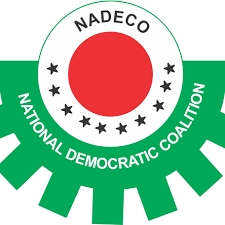NADECO – Bringing pro-democracy movement into disrepute?
Whenever the post-independence history of Nigeria is written, the struggle for good governance will cover the initial failure of elected civilians to govern properly after independence, the intervention by unelected military officers who thought they could do better, and the emergence of the pro-democracy movements which played a noble role in getting the military to […]

Whenever the post-independence history of Nigeria is written, the struggle for good governance will cover the initial failure of elected civilians to govern properly after independence, the intervention by unelected military officers who thought they could do better, and the emergence of the pro-democracy movements which played a noble role in getting the military to return to the barracks having abysmally failed in governance.
Unfortunately, for Nigeria, the eight years of the Buhari administration revealed the paradox of poor leadership as the nation was misgoverned by a soldier in civilian garb. Former military Head of State Muhammadu Buhari was one of those egoistic military officers who believed that despite his suspect educational qualifications and being untrained in public administration and despite having no in-depth knowledge of political philosophy he could govern well. Even after failing as a military Head of State in 1983, he contested and won election in 2015 and having learnt nothing failed again as a civilian President!
Back in 1994, a National Democratic Coalition (NADECO) was launched by Michael Adekunle Ajasin and Chief Anthony Enahoro in a bid to stop military adventurists from installing illegal governments. The coalition comprised prominent Nigerians united in the belief that the military should leave governance to democratically elected civilians.
NADECO was a coalition of assorted social, cultural and political groups such as Afenifere, Chief Enahoro’s Movement for National Reformation (MNR), Phillip Asiodu’s Campaign for Democracy (CD), Gani Fawehinmi’s National Conscience Party (NCP), and Professor Wole Soyinka’s National Liberation Council (NALICON) amongst others. Their common goal was a desire for a return to democracy. The then military dictator Sani Abacha proscribed NADECO, attacked or detained its members, assassinated Kudirat Abiola amongst others, and made it abundantly clear that he would eliminate all those standing in his way of looting the treasury and clinging onto power. By 1996 leading NADECO members were either imprisoned, in exile, or dead.
Bauchi, Jigawa, Kebbi, Nasarawa to benefit from €60m grant to tackle malnutrition
Police assure Calabar residents of crime-free carnival
Succour of sorts came when both Sani Abacha and Moshood Abiola died in mysterious circumstances and the military having monumentally failed in governance pledged to organise elections and return to barracks. Consequently, Chief Enahoro informed NADECO leaders exiled with him in the USA that their work was over and what was now required was to participate in the new democratic dispensation. Leading exiled NADECO members like Bola Tinubu concurred and returned to Nigeria to join the political mainstream and successfully contested elections as Governor of Lagos State and later as President of the Federal Republic of Nigeria. Chief Enahoro himself decided not to contest for political office but rather concentrate on calling for a national conference to restructure the nation, recognise the rights of ethnic nationalities, and produce a new constitution which was an MNR agenda, not an agreed NADECO agenda. Along with Professor Wole Soyinka he formed a pro-National Conference Organization (PRONACO) to lobby for restructuring and a new constitution, arguing that the document the military handed over was not a “Constitution” but rather a seriously flawed and defective “Military Decree for Civilian Administration”!
It surprised them that some people chose to continue parading under the name of NADECO since the coalition had run its course, the true leaders had moved on, and the nation is now practising democracy, no matter how defective.
It is self-evident that those remaining in NADECO have their own personal agenda which has nothing to do with opposing military rule. In a letter signed by Lloyd F. Ukwu Esq, on behalf of “NADECO USA” President Tinubu was urged to resign as a result of revelations which came to light during the 2023 Presidential campaign. In reply the National Publicity Secretary of “NADECO Nigeria” Mr. Ayo Okpadokun disowned NADECO USA which he claimed had been dissolved by Chief Anthony Enahoro and hijacked by nonentities. Whereas, the truth is that NADECO as a whole was dissolved by the announcement made in the USA. While Okpadokun’s claim that the structure of the nation is warped, skewed, and lopsided is true, it is not the concern of NADECO. By suggesting restructuring NADECO is now ignoring its raison d’etre and trespassing in the political arena. It is certainly not their business to campaign for political programmes. Instead of acting as if President Tinubu owes them, which he does not, to remain relevant they should comment on defective democratic practices, and concentrate on agitating for elections to be less shambolic, less expensive, freer, fairer, and the results more trustworthy. Describing President Tinubu as a “critical stakeholder in the highest structure of NADECO is true, but by expecting him to govern as they think fit, NADECO spokespersons appear not to understand how Nigeria’s democracy operates. In representative democracy, it is local government councillors, State House of Assembly members, House of Representatives members, and Senators who are paid to represent the interests of their constituents, while the president is tasked with running the nation to the best of his ability, not to carry out programs of others. The remaining NADECO members must understand that they should, as they say in the US, “get with the game” and join the political mainstream rather than use the appellation “NADECO” to give themselves an unwarranted status in political affairs.
The quarrel between the factions of this proscribed, defunct, unregistered and still illegal organisation whose objectives have long since been fulfilled is simply bringing the once noble concept of a pro-democracy movement into disrepute.
